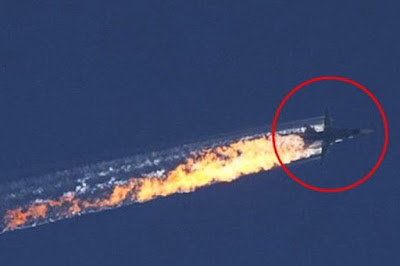Nov 2015 - clik1 clik2 clik3 clik4 clik5 clik6 clik7 clik8
"Sem ameaça, não se derruba um jato por motivo tão pequeno, só pode ter sido tudo pré-planejado".
"Foram míseros 17 segundos, alí Turquia quis arriscar deflagrar um conflito entre OTAN e Rússia".
The highlighted passage reads: “Disregarding these warnings, both planes, at an altitude of 19,000 feet, violated Turkish national airspace to a depth of 1.36 miles and 1.15 miles in length for 17 seconds from 9:24:05 local time." So, as RT notes, even if we buy Turkey's story (i.e. if we accept that Russia actually did violate Turkish airspace), then it would appear that Ankara has something of an itchy trigger finger. That is, Turkey was apparently willing to risk sparking a wider conflict between NATO and Russia over a 17 second incursion. But something doesn't sound right. In other words, as Sputnik put it earlier this evening, "according to those numbers, the Su-24 would have had to be flying at stall speed."
Pretexto forjado: alega advertir 10 vezes em 5 min, mas violação alegada durou só 17 segundos.
"Turquia violou 2.244 vezes o espaço aéreo grego, só em 2014".
“The Turks are trying to enforce sovereignty over disputed islands and bring Greece to the negotiating table,” Thanos Dokos, the director general of the Hellenic Foundation for European and Foreign Policy, told the Politico news website in July. “What’s worrying are the low-altitude flights, often by helicopters, over these islands.” Turkey fails to respect the 10-mile airspace surrounding the Aegean Islands, which causes numerous dogfights between Greek and Turkish aircraft invading the area. From January to October 2015, the country’s airspace was violated 1,233 times including 31 flights over Greek territory itself, according to the Greek Air Force’s headquarters. Greek media noted the Turks are taking advantage of the country’s economic hardships.
“In the case of air incursions, you have to react,” Thanos Dokos said. “It’s very hard to unilaterally pull back from a situation of military aggression. It’s a tragic situation, because the money we’re spending on dogfights with Turkey is money that we could have spent on other areas of defense.” Media attention has also focused on Turkish naval vessels repeatedly breaching national maritime borders. Over just seven months – from January to July 2015 – the Turkish Navy made 175 incursions into Greek maritime waters. In June, the Turkish Navy ship, the Gelibolu, repeatedly went on “patrol” in Greek territorial waters, a move that angered many in Greece. Earlier on Wednesday, Greek Foreign Minister Nikas Kotzias expressed solidarity with Russia in a phone conversation with Russian FM Sergei Lavrov. The Russian Foreign Ministry said: “Athens agrees with the Russian president’s assessment on Ankara’s hostile actions, which are contrary to the goals of the anti-ISIS coalition,” RIA Novosti reports. Greece, according to its Foreign Ministry, “especially comprehends provocative moves by Turkey given regular multiple violations of Greek air space by Ankara lasting for years.”
"Foi emboscada. Por vários dias esperaram pela chance".
Russian military expert and blogger Vladislav Shurygin claims the Turkish air force had been trying to catch and destroy Russian attack aircraft “for several days.” "When our aircraft took off, the Turks immediately scrambled theirs, and at the approach of our fighter bombers to the area of the fighting, between four and six Turkish F-16s were constantly in the air," he wrote in his blog on Livejournal.com. "Several times the Turkish command moved the closest pair to the border into firing position, but recalled them as they approached it, explaining these steps by 'accompanying' foreign aircraft," he wrote, though he gave no explanation of the sources on which he was basing such conclusions. According to him, a day before the incident, Turkish fighters started locking on to Su-24s even before they approached Turkish airspace – though Shurygin did not explain where he got his information. "The missile launch was carried out effectively over the border of Turkey and Syria, after which the Turkish F-16 flew into Syrian airspace for at least four kilometers," Shurygin wrote.







